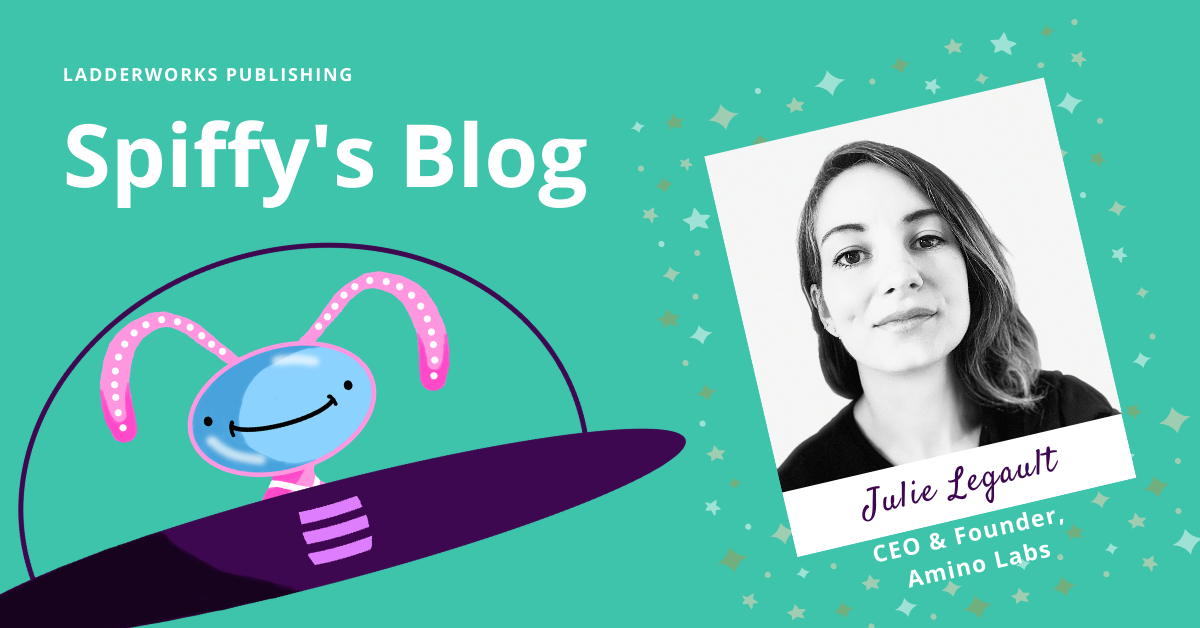Self-Learning Biotech Brings Families Closer Together

Hi Everyone! My name is Spiffy, the interplanetary journalist. This month I’m interviewing entrepreneurs who are making education more accessible for everyone! Today I’m talking to Julie Legault.
SPIFFY: Hi Julie! Thank you for meeting me today. Could you tell me about the challenge you’re addressing at Amino Labs?
Julie: The biotech industry impacts billions of lives each year and is a cornerstone of our society. Every day, astounding advances in biotechnology continue to reshape our future society, economy, and the environment in which the next generation will live and work.
Despite this, only a small fraction of the population understands what biotechnology is and can use it to help solve some of the world's biggest problems: climate, food and nutritional scarcity, medicine, to COVID-19. Amino Labs' mission is to enable millions to learn and practice biotechnology to become bio-artists, bio-engineers, bio-enthusiasts, or simply become bio-literate.

SPIFFY: Biotech impacts everyone, so it only makes sense that everyone should know about it! What motivated YOU to do this?
Julie: As a graduate student, I participated in a small kitchen 'bio-hack.' I instantly loved the potential of biotech as a new design medium. Unfortunately, once I got space in a traditional lab, exploring biotechnology wasn’t as easy, fun, or affordable; it was intimidating! So, that's why our first minilab, the Amino, was born! I wanted to self-learn and make with biology in the same way I did when I was a teenager in my dad’s garage.
Now, seeing what teenagers choose to do once they've learned the basics with Amino takes my breath away. They're already working to solve some of our biggest problems using biotech!
SPIFFY: Now I see how access to biotech & self-learning really inspires people, but how does it make the world a more equitable place?
Julie: Learning the basics of biotech usually requires going to a good university, which comes with a financial barrier and is susceptible to social and geographical inequity.
By creating affordable and friendly minilabs, kits, and books that make programming biology accessible to all, Amino Labs is fostering the next generation of innovators! While there is still a price tag, our democratized biotech learning and innovating is feasible for the general public. And it’ll keep getting more affordable.
SPIFFY: Could you tell me about a milestone you’ve hit recently?
Julie: Inspired by O'Reilly's self-directed programming books, we hypothesized that the same could apply in biotech. After years of writing and more than a year since publishing Zero to Genetic Engineering Hero, the world's first self-directed guidebook for biotechnology is a hit! With overwhelmingly positive feedback, more than a thousand copies are out there, and many communities and learning spaces have adopted it as their curriculum. Stay tuned for the next edition and expanded series!
SPIFFY: Congratulations! Books are a great way to educate future innovators. How have you dealt with failure in Amino Labs? What have you learned from it?
Julie: Amino Labs has lived with micro failures since the beginning. Early on, we decided to adopt the “deploy or die” mentality and Lean startup methodologies. Naturally, this means that you’re sometimes shipping “good ideas” to test them in the real world. You find this is a humbling experience and that your “good ideas” were, in fact, just “ideas” or that they even were terrible ideas! (You can have a listen to Eric Ries’ Lean Startup podcast and hear more from our journey!)
There’s an accurate representation of a startup’s journey in Paul Graham’s “Startup Curve.” In it, you can easily see a startup’s need for perseverance. Thankfully, Amino Labs is now past the “Trough of Sorrows,” aiming for the “Promised Land.” The Trough of Sorrows was a tough time… 😅
SPIFFY: I’m glad you survived a few terrible ideas! I’d like to hear about a time you learned from someone unexpectedly.
Julie: Oh, all the time! With COVID-19, many people are now transitioning to learning new things from home. In the past, we've primarily seen teenagers be active in learning with the Zero to Genetic Engineering Hero journey. But recently, there's been a surge of adults and parents learning on their own, or alongside their kids. It's exciting! And it's also helping them understand the importance and reasons behind the safety measures put forth in the pandemic which are crucial in keeping everyone safe. It's never too late to learn!
SPIFFY: Biotech self-learning can bring families together too! Thanks for taking the time today, Julie.
Julie: No problem, Spiffy. I’m happy to share.
Designer Julie Legault crafts complex technologies into accessible experiences for the general public. Julie is the founder and CEO of M.I.T. spin-off Amino Labs, the pioneering company of biotechnology in the home and school and biotechnology faculty at Singularity University Canada. (Nominated by Indiebio | SOSV)


